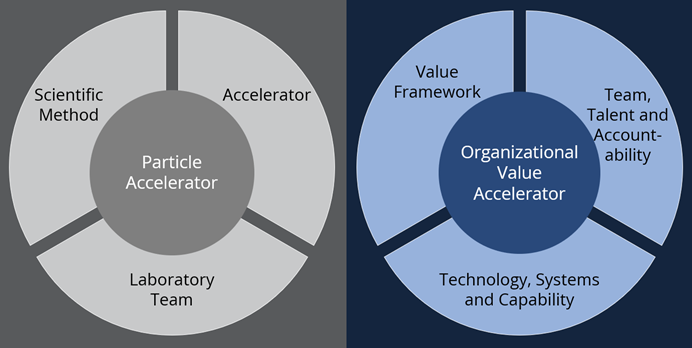The single most recognizable accelerator is the particle accelerator, which has the primary function of speeding up a beam of particles to steer and focus them. Their resulting application has touched almost every human on the planet through the use of image screening at airports, semiconductors, the creation of new drugs, cancer treatments and shrink wrap.
Much like researchers who use particle accelerators for scientific breakthroughs, organizations are continuously seeking ways to accelerate how they achieve value from their data. Yet very few can harness it fully.
Researchers using a particle accelerator require three key components: the scientific method, the accelerator and the laboratory team. These three components can be used as a reference for organizations in achieving their value accelerator.
Like in a particle accelerator, the three key components to accelerating value from your data need to work harmoniously together:
- Your data value framework
- Your technology, systems, capability
- Your team, talent and accountability
How to Accelerate Organizational Value from Your Data
Organizations should follow the following three steps.
- Connect your data strategy to your organizational values.
Is there an understanding of what business ecosystem health and success looks like beyond cost and profit?
Commercial decisions and outcomes have dominated the topic of value for decades. This is changing. Increasingly employees and consumers are conscientious of social and environmental matters as part of their selection of products and organizations. According to ISG’s Future of Work – Post-Pandemic Return to Work 2022, 60% of consumers are ready to switch brands if the brand doesn’t match the consumer’s values. Organizations need to understand this broader sense of organizational value.
Most if not all companies have a mission, vision, goals and objectives. They know what products and services they develop. The missing factor is a purpose-led approach for defining value and defining the data that will measure and bring it into reality. Nearly three-quarters of businesses have either a data strategy that sits outside the operating model or lack a data strategy all together. This contributes to the sense that value is detached from organizational success rather than being integrated into and delivering it.
The Chief Data Officer (CDO) is in a position to lead this charge, with close to half reporting to the CEO or president of the company. The CDO can make themself aware of what is being collected and used by business users to identify potential synergies across the organization.
Existing enterprise value frameworks, such as triple bottom line, business-value oriented principles, Kaizen and Agile, can help an organization elucidate the values they want to strive for, whether it be customer satisfaction, health of employees, doing no harm to the environment or safety of communities. Getting clear on your highest values first will be the only way to design a method for collecting data to support them – now and in the future.
- Define your value accelerator toolkit and make an end-to-end process.
Many organizations invest a great deal in data and still do not achieve the business value they need. One of the top five concerns for CDOs is achieving business value and enabling decision-making through data initiatives. To harness the value of data, organizations must treat it as an asset.
Like physical assets, data must be properly developed, maintained, upgraded and disposed of. This includes using a combination of the right technology, capability and operating model to:
- treat data as a raw material, understanding from where it is sourced and the chain of ownership
- connect it through architecture and data flows
- represent it through human insights and storytelling
- govern it in terms of storage, security, access and eventual deletion
- understand its purpose and applied use cases
- use it to support the ambitions of the organization, its employees, customers and partners
At times, teams will need to use data to enable exploration, research and build proof of concepts in ways that do not impact the core business. Newer techniques and technologies such as AI, ML and, more recently, generative pre-trained algorithms like ChatGPT should be tested in a laboratory environment before being used in an organization or with customers. These capabilities need to be fed into the value accelerator to evaluate whether they can be scaled for a purpose. - Invest in your data team, talent and accountability.
An entire team – and not just the “data experts” – needs to deliver this value-accelerator approach. While governance models exist, accountability can be problematic if those nominated do not understand the data and how it adds value. Skills, resources and training for data literacy are essential for an enterprise-wide data-driven culture.
Don’t let weak executive buy-in undermine the potential value of data investments and initiatives. Leadership may inadvertently revert to a reliance on cost/revenue models or believe financial support is all that is needed. But, when everything is qualified only in monetary terms, it can lead to chasing value from data rather than harnessing it, as best said by the former Head of Sustainable Investing in BlackRock, this can be “a dangerous distraction from solutions.”
ISG helps enterprises design data strategies that support their highest goals and deliver in real, applicable organizational value. Contact us to get started.

